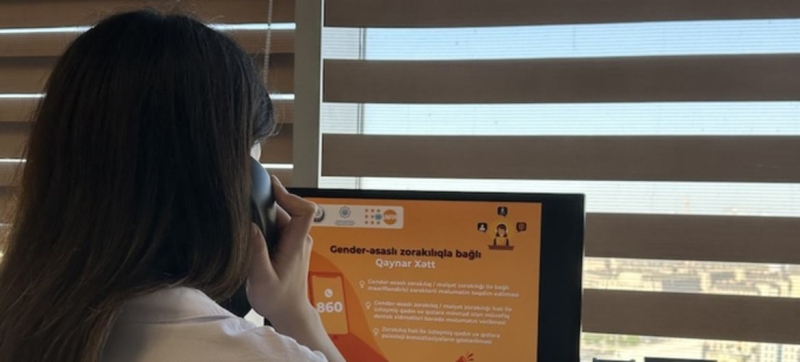
The helpline for victims of gender-based violence in Azerbaijan, supported by UNFPA, has so far processed more than 1,100 calls. “Hope dies last”: UN helps victims of gender-based violence in Azerbaijan Women
The United Nations Population Fund (UNFPA) supports Azerbaijani women victims of gender-based violence. For them, together with the government of the country, a hotline has been established, which has already received more than 1,100 calls, mainly from women and girls from vulnerable sections of the population.
Ainur’s relationship with Rauf (names have been changed) began as a fairy tale. The 24-year-old resident of Azerbaijan met her future love almost immediately upon returning from Poland, where she completed her master’s degree. The girl hoped to get a job in her homeland as an English teacher.
Ainur began dating Rauf and married him a few months later. After the wedding, the guy seemed to have been replaced – there were commanding notes, attempts to subjugate the young wife. “He didn’t let me use a mobile phone, forbade me to watch TV or go out alone, and didn’t allow me to communicate with my family without him,” recalls Ainur.
Over time, the woman began to suspect that her husband was cheating on her, and when she tried to share her doubts, he locked her in a room for several days without food.
“The saying goes that that hope dies last sounded like a credo to me,” says Ainur. She hoped that her husband would calm down when he found out that she was pregnant. “My hopes were not justified: after the birth of my daughter, nothing changed. My husband’s parents blamed me for his change in behavior,” says the woman.
According to research, a third of all women in Azerbaijan experience some form of violence from a partner, but few who has the opportunity to seek help or complain to the police.
Requests for help
When Ainur’s patience came to an end, she tried to leave, but it was not easy. Someone advised her to call 860, a hotline supported by UNFPA, the United Nations Population Fund, which works on reproductive and sexual rights issues around the world. The line was created to provide confidential assistance to women and girls suffering from gender-based violence.
Ainur was very afraid that she would not be given a child in a divorce. Moreover, she doubted that she would be able to take care of her daughter without support. When the woman finally turned to the hotline for help, she received answers to all her questions. After eight sessions with a psychotherapist, Ainur gained enough self-confidence to leave her husband.
“The psychotherapist helped Ainur look into herself, remember her career before marriage, helped strengthen faith in her strengths and realize her capabilities,” says Aigul Abbasova, a psychologist who works with those who asked for help on the hotline.
The hotline is part of a program called “Women in Focus”, which is implemented by the Azerbaijan State Committee for Women and Children’s Affairs. A team of hotline specialists – psychologists, a coordinator, a financier and a lawyer – help victims receive medical care, a temporary roof over their heads and legal advice.
The line was opened in 2020, and since then it has received 1,100 calls. In most cases, women and girls from vulnerable groups sought help. “Victims, as a rule, do not believe in their own capabilities and have difficulty assessing anything beyond the current situation,” says Abbasova.
Looking into the future
Thanks to the support she received, Ainur returned to work as an English teacher, taking a major step towards financial independence. Later, the husband tried to make peace and even came with his parents to the woman’s home. “He even said that he was ready to forgive me for leaving him,” recalls Ainur.
However, having gained self-confidence and assessed her capabilities, the woman refused return to her husband, who tried to suppress her and cut her off from the outside world.
“I will learn from the lessons of the past, live in the present and hope for the future,” the woman says. “Now I live for my daughter and for myself.”
